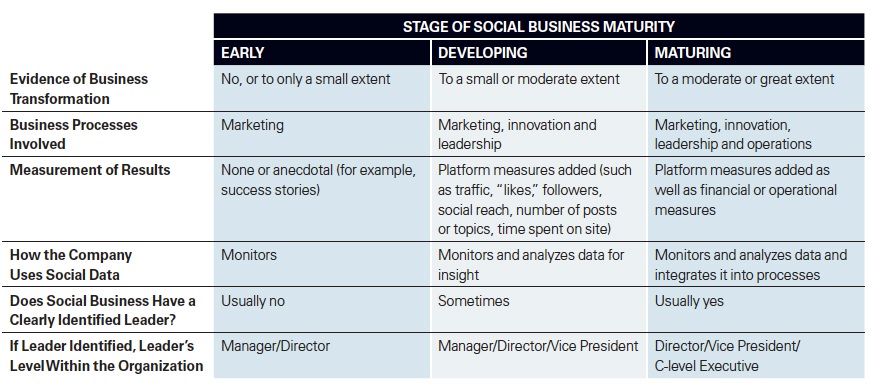Interesting article in the MIT/Sloan Review about companies who are succeeding in using Social Business tools. They surveyed over 4,800 respondents around the world. In essence the research` shows that value is concentrated most strongly in companies that have reached a certain level of sophistication in relation to their social business initiatives, which they refer to as social business maturity (see diagram above). In summary, they see six major signals of increasing maturity (summarised below):
Social business maturity involves business process transformation, not just using social tools and technologies in the enterprise. We asked respondents whether social business initiatives lead them to develop new business processes or fundamentally transform existing ones. Seventy-one percent of respondents in maturing social businesses say that their social business initiatives involve a fundamental transformation in business processes, as opposed to only 28% of respondents from companies in the early stage of social business maturity. This finding suggests that social business entails more than just adopting social tools in an organization. Rather, it involves redesigning business processes in ways made possible by these tools.
Social business often starts in marketing, then gets applied to other functions and processes. We asked respondents for what purposes their companies used social business tools. Companies in the early phases of social business maturity were more likely to report using social business primarily for externally facing activities, specifically marketing functions. Companies with a greater level of social business maturity, in contrast, were more likely to report social business use balanced between internal and external uses, with both innovation and leadership applications used nearly as much as marketing applications. Only maturing social businesses report applying social business tools to business operations to a great or moderate extent (60%), compared with 13% of the companies in an early stage of social business maturity.
Social business maturity involves increasing sophistication in measurement. Companies have been looking for ways to effectively measure social business results to assess ROI:
First, although 52% of the least socially mature companies do not measure their social business initiatives, this number drops substantially as companies move out of this earliest stage of maturity. Second, although anecdotal evidence is only the first step toward measurement, it remains nearly equally important for companies at all stages of social business maturity. Even the companies with the most mature social business practices apparently need to continue telling success stories to drive use of social business tools. Third, once companies begin quantitatively measuring social business results, our data suggest a path of increasingly sophisticated measurement.
More mature social businesses increasingly rely on social data. Our research also suggests that companies with more mature social business practices are more likely to rely on social data. Eighty-eight percent of respondents from such companies say social data are important, compared with 38% of those from companies in the early stages of social business maturity. Maturing social businesses are also more likely to use this data in different ways than companies with less mature social business practices. For example, while only 8% of companies in the early stages of social business maturity integrate social data into their operations to a moderate or great extent, 67% of maturing social businesses do so.
Social business maturity involves a higher level of responsibility and accountability within the organization. More mature social businesses are more likely to report a single leader or group responsible for social business initiatives. These leaders are also likely to be at a higher level (such as a vice president or member of the C-suite) in more mature social businesses. State Street’s Hannah Grove noted the importance of managerial responsibility for social business. “Ownership is a very important question, particularly when you think about the ramifications for anything not working out well,” she said. “And so there really has to be a sort of singular owner — for lack of a better word, governance and compliance — just to make sure that people don’t go off the reservation.”
Maturing social businesses manage new challenges along with successes. Greater social business maturity does not necessarily mean that a company has overcome the challenges associated with social business. In fact, some of our data suggest successful social business initiatives might actually introduce new problems for companies. In multinational companies, although social business maturity was highly correlated with how much social business helped a company operate across geographies, it was also associated with increased operational challenges across geographies.
This report comes at an interesting time, given that Gartner recently estimated that through 2015, nearly 80% of social business initiatives would fail to meet their stated business objectives. Both that report and this may be true, I recall in the early days of MRP II (precursor to ERP) system implementations, making it work was hard and there were many failures, and the companies that made it work had to change a lot of things – it was quite a journey.
To us the conflicting reports, and many of the first generation suppliers consolidating, is a sign that the market is in a changing phase – but reports of its death are somewhat over-estimated in our view.
